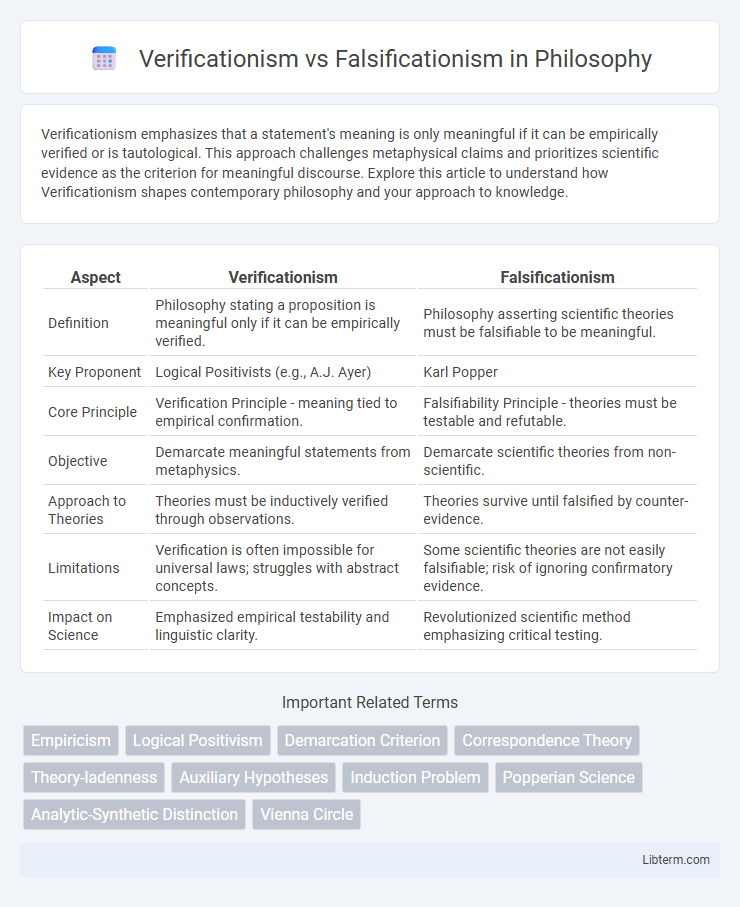Verificationism emphasizes that a statement's meaning is only meaningful if it can be empirically verified or is tautological. This approach challenges metaphysical claims and prioritizes scientific evidence as the criterion for meaningful discourse. Explore this article to understand how Verificationism shapes contemporary philosophy and your approach to knowledge.
Table of Comparison
| Aspect | Verificationism | Falsificationism |
|---|---|---|
| Definition | Philosophy stating a proposition is meaningful only if it can be empirically verified. | Philosophy asserting scientific theories must be falsifiable to be meaningful. |
| Key Proponent | Logical Positivists (e.g., A.J. Ayer) | Karl Popper |
| Core Principle | Verification Principle - meaning tied to empirical confirmation. | Falsifiability Principle - theories must be testable and refutable. |
| Objective | Demarcate meaningful statements from metaphysics. | Demarcate scientific theories from non-scientific. |
| Approach to Theories | Theories must be inductively verified through observations. | Theories survive until falsified by counter-evidence. |
| Limitations | Verification is often impossible for universal laws; struggles with abstract concepts. | Some scientific theories are not easily falsifiable; risk of ignoring confirmatory evidence. |
| Impact on Science | Emphasized empirical testability and linguistic clarity. | Revolutionized scientific method emphasizing critical testing. |
Introduction to Verificationism and Falsificationism
Verificationism asserts that a statement is meaningful only if it can be empirically verified through observation or experimentation, aligning closely with the principles of logical positivism. Falsificationism, introduced by Karl Popper, argues that scientific theories cannot be conclusively verified but must be structured to allow for potential falsification through critical testing. Both approaches address the demarcation problem in the philosophy of science by establishing criteria for meaningful and scientific statements.
Historical Background of Both Philosophies
Verificationism emerged from the early 20th-century Vienna Circle, rooted in logical positivism and emphasizing empirical verification as the criterion for meaningful statements. Falsificationism, developed by Karl Popper in the mid-20th century, arose as a critical response to verificationism's limitations, advocating falsifiability as the demarcation criterion for scientific theories. Both philosophies significantly shaped the philosophy of science by addressing the problem of distinguishing scientific knowledge from metaphysics through validation and refutation processes.
Key Principles of Verificationism
Verificationism centers on the principle that a statement's meaning is determined by its method of empirical verification, emphasizing the criterion of verifiability as essential for meaningful discourse. It asserts that a proposition is only cognitively meaningful if it can be conclusively proven true through direct observation or logical analysis. This approach prioritizes observable evidence and logical positivism while dismissing metaphysical or speculative claims as nonsensical.
Core Tenets of Falsificationism
Falsificationism centers on the principle that scientific theories must be inherently refutable through empirical observation, emphasizing that no number of positive outcomes can conclusively verify a theory, but a single counterexample can invalidate it. This approach, championed by philosopher Karl Popper, argues that the demarcation between science and non-science relies on testability and the potential for falsification rather than verification. Falsificationism promotes rigorous hypothesis testing and continuous scrutiny, driving scientific progress by systematically eliminating false theories.
Major Proponents and Influencers
Verificationism, championed by members of the Vienna Circle such as Rudolf Carnap and A.J. Ayer, emphasizes the principle that a statement is meaningful only if it can be empirically verified. In contrast, falsificationism, primarily advocated by Karl Popper, argues that scientific theories cannot be conclusively verified but must be testable and falsifiable to be considered scientific. These philosophical stances significantly influenced the development of the philosophy of science by shaping criteria for scientific demarcation and empirical validation.
Scientific Method: Verification vs. Falsification
Verificationism emphasizes the accumulation of empirical evidence to confirm scientific hypotheses, asserting that a theory is meaningful only if it can be definitively verified through observation or experiment. Falsificationism, proposed by Karl Popper, argues that scientific theories cannot be conclusively proven but must be testable and refutable, with a hypothesis considered scientific only if it can be potentially falsified. The scientific method, under verificationism, prioritizes confirming data, whereas falsificationism advances progress by rigorously attempting to disprove theories, ensuring continuous critical testing and refinement.
Criticisms of Verificationism
Verificationism faces criticism for its rigid criterion that only empirically verifiable statements are meaningful, which many argue dismisses important scientific hypotheses and ethical claims as nonsensical. Critics highlight its failure to account for the theoretical nature of scientific laws and the problem of universal statements that cannot be conclusively verified but have predictive power. The approach struggles with self-refutation since the verification principle itself cannot be empirically verified, undermining its overall philosophical coherence.
Critiques of Falsificationism
Falsificationism faces critiques for its inability to conclusively falsify scientific theories due to the Duhem-Quine thesis, which argues that hypotheses cannot be tested in isolation but only within a network of assumptions. Critics also highlight that some scientific theories, especially in physics and biology, are not easily falsifiable yet remain empirically valuable. Furthermore, the strict criterion of falsifiability may exclude progressive scientific theories that initially lack clear falsifiable predictions but contribute to knowledge advancement.
Impact on Modern Philosophy of Science
Verificationism, emphasizing empirical verification as the criterion for meaningful statements, shaped early logical positivism but faced criticism for its self-referential limitations, leading to a decline in influence. Falsificationism, introduced by Karl Popper, redefined scientific progress by prioritizing testability and refutability of hypotheses, becoming a cornerstone in contemporary philosophy of science. Its impact endures in scientific methodology, stressing the provisional nature of knowledge and encouraging continuous experimental testing over absolute proof.
Conclusion: Which Approach Prevails?
Falsificationism prevails as the dominant scientific philosophy due to its emphasis on testability and refutability, enabling continuous progress through the elimination of false hypotheses. Verificationism, which focuses on confirming theories with positive evidence, struggles with the problem of induction and cannot guarantee absolute truth. Scientific methodologies prioritize falsifiability as a criterion for demarcating scientific theories, reinforcing the enduring influence of Karl Popper's falsification principle over the verificationist approach.
Verificationism Infographic

 libterm.com
libterm.com